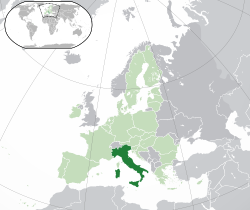Italy is a country that bridges Southern and Western Europe, boasting a rich tapestry of history, art, and cuisine. It’s shaped like a boot kicking a soccer ball, with the Mediterranean Sea lapping at its shores. Home to nearly 60 million people, Italy’s a heavyweight in European politics and culture.
From Ancient Rome to the Modern Republic
Italy’s story is long and winding. It starts with the ancient Romans, who built an empire stretching from Britain to the Middle East. After Rome fell, Italy became a patchwork of city-states and kingdoms. Fast forward to the 19th century, and you’ve got the Risorgimento – Italy’s push to become one nation. In 1861, they made it happen, with Victor Emmanuel II as the first king of a united Italy.
But Italy’s path wasn’t always smooth. It went through fascism under Mussolini and the turmoil of World War II. In 1946, Italians voted to ditch the monarchy and become a republic. Since then, they’ve been riding the waves of economic booms and busts, but always with style.
A Landscape That’s Pure Eye Candy
Italy’s got it all: the snowy Alps in the north, sun-baked beaches in the south, and everything in between. The Apennine Mountains run down its spine like a backbone. You’ve got active volcanoes like Mount Etna in Sicily, ready to put on a fiery show. And let’s not forget the Po Valley, Italy’s agricultural heartland.
Climate: From Alpine Chill to Mediterranean Thrill
Italy’s weather is as varied as its landscape. Up north, you might need a parka in winter. Down south, you’re more likely to need sunscreen year-round. The Mediterranean climate dominates, bringing hot, dry summers and mild winters to much of the country.
Biodiversity: Italy’s Natural Talent Show
Italy’s like nature’s talent show, with a cast of thousands. We’re talking 57,000 species of animals and plants. Some are local celebrities, like the Italian wolf or the Sicilian fir. Italy’s taking steps to protect this natural wealth, with national parks covering about 11% of the country.
Politics: A Lively Democracy with Italian Flair
Since 1946, Italy’s been a parliamentary republic. The president’s the head of state, but the prime minister’s running the show day-to-day. Italian politics can be as dramatic as an opera, with coalitions forming and falling apart. As of 2022, Giorgia Meloni made history as Italy’s first female prime minister.
Economy: From Pasta to Prada
Italy’s economy is a mix of old-school craftsmanship and cutting-edge innovation. It’s the third-largest in the eurozone and a member of the G7 club of wealthy nations. Italy’s known for its fashion (Gucci, Prada), cars (Ferrari, Lamborghini), and food (pizza, pasta, need we say more?). But it’s also a leader in machinery and robotics.
Italy’s story is far from over. It’s a country that’s always reinventing itself, blending the old with the new. From the ruins of ancient Rome to the runways of Milan Fashion Week, Italy keeps surprising and delighting the world.
Citations:
Italy, officially the Italian Republic, is a country in Southern and Western Europe. It consists of a peninsula that extends into the Mediterranean Sea, with the Alps on its northern land border, as well as nearly 800 islands, notably Sicily and Sardinia. Italy shares its borders with France, Switzerland, Austria, Slovenia, two enclaves—Vatican City and San Marino and shares a maritime border with Croatia to the east. It is the tenth-largest country in Europe by area, covering 301,340 km2 (116,350 sq mi), and the third-most populous member state of the European Union, with nearly 60 million inhabitants. Italy's capital and largest city is Rome; other major urban areas include Milan, Naples, Turin, Palermo, Bologna, Florence, Genoa, and Venice.
Italian Republic Repubblica Italiana (Italian) | |
|---|---|
| Anthem: "Il Canto degli Italiani" "The Song of the Italians" | |
Location of Italy (dark green) – in Europe (light green & dark grey) | |
| Capital and largest city | Rome 41°54′N 12°29′E / 41.900°N 12.483°E |
| Official languages | Italiana |
| Nationality(2021) |
|
| Native languages | See main article |
| Religion (2020) |
|
| Demonym(s) | Italian |
| Government | Unitary parliamentary republic |
| Sergio Mattarella | |
| Giorgia Meloni | |
| Ignazio La Russa | |
| Lorenzo Fontana | |
| Legislature | Parliament |
| Senate of the Republic | |
| Chamber of Deputies | |
| Formation | |
| 17 March 1861 | |
• Republic | 12 June 1946 |
| 1 January 1948 | |
| Area | |
• Total | 301,340 km2 (116,350 sq mi) (71st) |
• Water (%) | 1.24 (2015) |
| Population | |
• 2024 estimate | |
• Density | 195.7/km2 (506.9/sq mi) (71st) |
| GDP (PPP) | 2024 estimate |
• Total | |
• Per capita | |
| GDP (nominal) | 2024 estimate |
• Total | |
• Per capita | |
| Gini (2020) | medium inequality |
| HDI (2022) | very high (30th) |
| Currency | Euro (€)b (EUR) |
| Time zone | UTC+1 (CET) |
• Summer (DST) | UTC+2 (CEST) |
| Calling code | +39c |
| ISO 3166 code | IT |
| Internet TLD | .it |
| |
The history of Italy goes back to numerous Italic peoples, notably including the ancient Romans, who conquered the Mediterranean world during the Roman Republic and ruled it for centuries during the Roman Empire. With the spread of Christianity, Rome became the seat of the Catholic Church and the Papacy. Barbarian invasions and other factors led to the decline and fall of the Western Roman Empire between late antiquity and the Early Middle Ages. By the 11th century, Italian city-states and maritime republics expanded, bringing renewed prosperity through commerce and laying the groundwork for modern capitalism. The Italian Renaissance flourished during the 15th and 16th centuries and spread to the rest of Europe. Italian explorers discovered new routes to the Far East and the New World, contributing significantly to the European Age of Discovery.
After centuries of political and territorial divisions, Italy was almost entirely unified in 1861, following wars of independence and the Expedition of the Thousand, establishing the Kingdom of Italy. From the late 19th to the early 20th century, Italy rapidly industrialised, mainly in the north, and acquired a colonial empire, while the south remained largely impoverished, fueling a large immigrant diaspora to the Americas. From 1915 to 1918, Italy took part in World War I with the Entente against the Central Powers. In 1922, the Italian fascist dictatorship was established. During World War II, Italy was first part of the Axis until its surrender to the Allied powers (1940–1943), then a co-belligerent of the Allies during the Italian resistance and the liberation of Italy (1943–1945). Following the war, the monarchy was replaced by a republic and the country enjoyed a strong recovery.
A developed country with an advanced economy, Italy has the ninth-largest nominal GDP in the world, the second-largest manufacturing industry in Europe, and plays a significant role in regional and—to a lesser extent—global economic, military, cultural, and political affairs. Italy is a founding and leading member of the European Union, and is part of numerous other international organizations and forums. As a cultural superpower, Italy has long been a renowned global centre of art, music, literature, cuisine, fashion, science and technology, and the source of multiple inventions and discoveries. It has the highest number of World Heritage Sites (60) and is the fourth-most visited country in the world.





